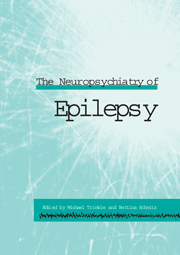Book contents
- Frontmatter
- Contents
- List of contributors
- Part I Background
- Part II Clinical aspects
- Part III Cognitive aspects
- 10 Dementia and epilepsy
- 11 The risk of cognitive decline in patients with refractory temporal lobe epilepsy
- 12 Behavioural and neuropsychological aspects of frontal lobe epilepsy
- Part IV Nonepileptic attacks
- Part V Treatment complications
- Part VI Treatment
- Index
12 - Behavioural and neuropsychological aspects of frontal lobe epilepsy
Published online by Cambridge University Press: 05 October 2010
- Frontmatter
- Contents
- List of contributors
- Part I Background
- Part II Clinical aspects
- Part III Cognitive aspects
- 10 Dementia and epilepsy
- 11 The risk of cognitive decline in patients with refractory temporal lobe epilepsy
- 12 Behavioural and neuropsychological aspects of frontal lobe epilepsy
- Part IV Nonepileptic attacks
- Part V Treatment complications
- Part VI Treatment
- Index
Summary
Introduction
To date, neurobiological interest in behaviour and epilepsy has been concerned primarily with temporal lobe epilepsies (TLE), and mesial temporal lobe epilepsies (mTLE) in particular. This concentration on TLE is mostly due to the fact that this type of epilepsy represents the majority of the focal epilepsies – in the Bonn series of patients with pharmacoresistant epilepsies this is about 80% – and that mTLE often forms an entity within the focal epilepsies regarding pathology (hippocampal sclerosis), a frequent history of febrile convulsions, an early onset of epilepsy, and memory problems as the prominent neuropsychological impairment. In TLE, the affected cerebral structures and epileptogenic region are mostly circumscribed, and structural pathology can be well quantified by quantitative MRI (T2 relaxometry and volumetry) or postoperative histopathological examinations of the resected specimen. Frequency, homogeneity and quantifiable pathology provide ideal prerequisites for the study of the functional and behavioural correlates of TLE. Great progress has been made during recent years, at least with respect to the neuropsychological and cognitive aspects of TLE. Recent developments in the field, however, show that it is well recognized that temporal lobe functioning involves more than memory and that its role in emotion and psychiatric symptoms is being rediscovered.
The conditions we meet with frontal lobe epilepsy (FLE) are quite different.
- Type
- Chapter
- Information
- The Neuropsychiatry of Epilepsy , pp. 164 - 186Publisher: Cambridge University PressPrint publication year: 2002
- 1
- Cited by



